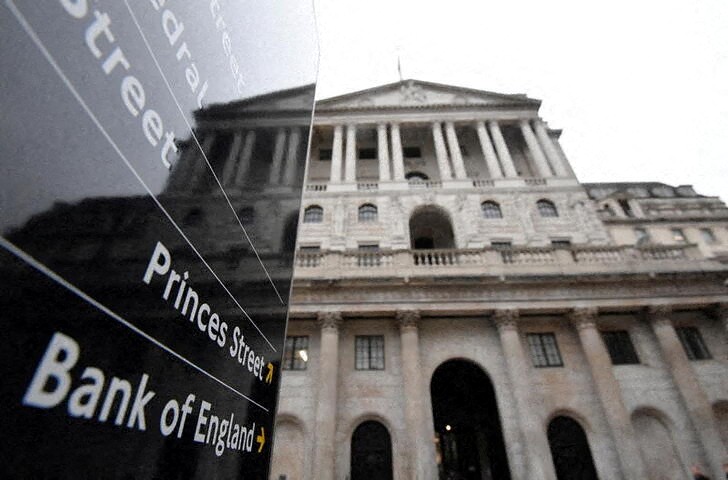LONDON (Reuters) - The last major central bank meetings of 2021 are over and the dividing lines are clear: those policymakers unnerved enough by high inflation to begin reversing pandemic-era stimulus now and those adamant that ultra-loose policy is still necessary.
The Bank of England on Thursday became the first major central bank to raise interest rates since the COVID-19 pandemic began. The U.S Federal Reserve also took a big step toward ending bond-buying and preparing for rate hikes, while the European Central Bank remains in the slow lane.
Here's a look at where policymakers stand on the path out of pandemic-era stimulus, in order of how hawkish they appear:
(Graphic on, Central bank balance sheets: https://fingfx.thomsonreuters.com/gfx/mkt/klvyknowjvg/theme1612.PNG)
1/ NORWAY
Norway's central bank cemented its position as the most aggressive rate-setter in the developed world, raising rates https://www.reuters.com/markets/europe/norway-hikes-interest-rates-with-more-come-2021-12-16 for the second time this year on Dec. 16 despite an expansion of COVID curbs that could hurt economic prospects.
Having kicked off policy tightening in September, the bank upped rates by 25 basis points to 0.5% and flagged more next year, potentially taking the key rate to 1.25% by end-2022.
(Graphic on, New Zealand, Norway lead way with rate hikes among developed economies: https://fingfx.thomsonreuters.com/gfx/mkt/mopanqrdzva/CBANKS1712.PNG)
2/ NEW ZEALAND
New Zealand's central bank hiked rates last month for the second time this year to 0.75% and forecast they would reach 2.5% by 2023.
Inflation has surged and a red-hot housing market has stoked fears of economic overheating.
Data this week showing the economy shrank a record 3.7% https://www.reuters.com/world/asia-pacific/new-zealand-gdp-shrinks-37-q3-due-delta-lockdowns-2021-12-15 in Q3 was not as bad as expected and with COVID-19 restrictions expected to ease, the numbers have not dampened rate hike expectations.
3/ BRITAIN
The Bank of England shocked markets https://www.msn.com/en-ca/money/topstories/boe-becomes-first-major-central-bank-to-raise-rates-since-pandemic/ar-AARRc2R on Thursday with a 8-1 vote to hike rates, deciding to stamp on inflation now, rather than wait to see how the fast-spreading Omicron variant of COVID-19 impacts the economy.
Explaining its 15 bps hike to 0.25%, the BoE said inflation was likely to hit 6% in April - triple its target - and that more rate rises would probably be needed.
Money markets, which had priced in an initial hike in February, now expect 25 bps more of tightening by March and a further two rate rises before end-2022.
(Graphic on, The BoE's base rate since 1900: https://fingfx.thomsonreuters.com/gfx/mkt/jnpweaobmpw/BoE1712.PNG )
4/ UNITED STATES
The Federal Reserve this week took a significant hawkish turn https://www.reuters.com/markets/us/fed-prepares-stiffen-inflation-response-post-transitory-world-2021-12-15.
On Wednesday, it committed to end its pandemic bond-buying by March and laid out an accelerated timetable for rate hikes.
Fed Chair Jerome Powell anticipates strong growth and full employment in 2022 and believes the central bank needs to treat inflation as the more pressing risk.
No surprise, then, that markets price in a strong chance of rates rising in May, with a hike by June fully priced in.
(Graphic on, Rising US inflation spurs Fed to action: https://fingfx.thomsonreuters.com/gfx/mkt/gdpzymgbovw/USCPI1712.PNG)
5/ CANADA
Comments by Bank of Canada governor Tiff Macklem this week suggest rates will start rising soon, given inflation at 18-year highs and fast-diminishing economic slack.
Money markets now almost fully price in a 25 bps rate rise in March. Canada's central bank said in October it would end its bond-buying programme and brought forward its projections for rate rises.
6/ AUSTRALIA
Australia's central bank is in the dovish camp, but only just.
Last month the Reserve Bank of Australia took a major step towards unwinding pandemic stimulus when it abandoned an ultra-low bond yield target and opened the door for a first rate hike in 2023, earlier than a previous forecast of 2024.
This week Governor Philip Lowe said he was open to ending bond buying as early as February but still thought it unlikely rates would need to rise in 2022 - putting the RBA towards the back of the tightening queue.
7/ SWEDEN
Sweden has ended pandemic-era lending facilities but says rates will rise only if inflation pressures change significantly. The bank has pencilled in a rate hike in late 2024.
But data this week showed headline inflation at a 25-year high https://www.reuters.com/markets/europe/headline-inflation-sweden-hits-fastest-pace-since-1993-2021-12-14, which one rate-setter said supported the case to further taper stimulus. Riksbank governor Stefan Ingves https://www.reuters.com/markets/europe/swedish-cbank-chief-says-inflation-surge-due-energy-prices-2021-12-14 attributed the surge to power prices.
8/ EURO ZONE
The European Central Bank is on a very different path to most of its peers.
On Thursday it said it would end its 1.85 trillion euro pandemic emergency asset-buying scheme next March.
But it also promised copious support via its long-running Asset Purchase Programme and signalled that any exit from years of ultra-easy policy will be slow. The ECB says a rate rise next year is unlikely and expects inflation, running at a record-high 4.9%, to retreat.
(Graphic on, Life after PEPP looms in the euro area: https://fingfx.thomsonreuters.com/gfx/mkt/byprjqabjpe/ECB1712.PNG)
9/ JAPAN
The Bank of Japan on Friday took tentative steps to unwind pandemic-era stimulus, saying it will slow purchases of corporate bonds and commercial paper to pre-pandemic levels from April.
But the bank maintained its short-term rate target at -0.1% and that for 10-year bond yields around 0%. With inflation well below its 2% target, the BOJ will likely maintain ultra-easy policies much longer than peers.
10/ SWITZERLAND
The Swiss National Bank stuck to its guns this week, saying its monetary policy stance, combining the world's lowest interest rates with frequent currency market interventions, remained appropriate.

While the Swiss franc's recent rise to 6-1/2-year highs has taken the edge off imported inflation, the SNB has intervened sporadically to keep the franc's gains in check. It recently launched its single biggest weekly intervention since mid-May.
(Graphic on, CHF intervention: https://fingfx.thomsonreuters.com/gfx/mkt/zjpqkyogbpx/CHF%20intervention.JPG )